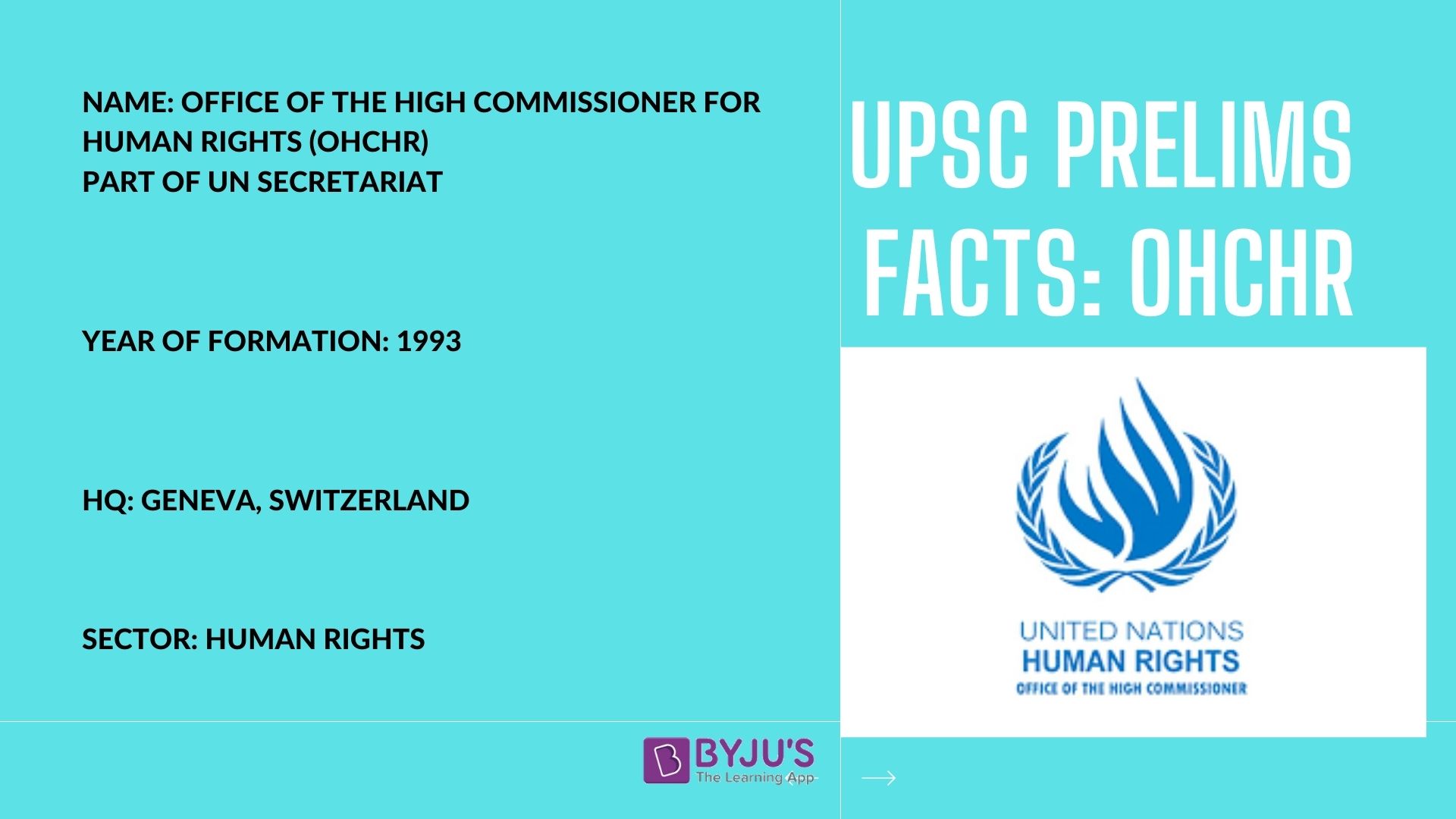The Office of the High Commissioner for Human Rights, also known as, the Office of the UN High Commissioner for Human Rights, is one of the UN human rights bodies. International organizations and UN bodies are especially important for the UPSC exam, as they feature regularly in the daily news.
| Aspirants should begin their preparation by solving UPSC Previous Year Question Papers now!!
To complement your preparation for the upcoming exam, check the following links: |
OHCHR UPSC Notes:- Download PDF Here
Office of the High Commissioner for Human Rights – OHCHR

The OHCHR is entrusted by the United Nations General Assembly (UNGA) with the mandate to protect and promote all human rights for everyone all over the world.
- It plays a vital role in conserving the integrity of the 3 interconnected pillars of the United Nations:
- Human rights
- Peace and security
- Development
- It offers technical expertise and capacity-development to aid the implementation of global human rights standards on the field.
- It actively helps governments in making the enjoyment of human rights a reality for everyone.
- The Office also speaks out on issues of human rights violations.
- It is a part of the UN Secretariat and was established in 1993.
- It is headquartered in Geneva and has many regional offices as well.
- The OHCHR is headed by the High Commissioner for Human Rights.
Note: The OHCHR is different from the United Nations Human Rights Council (UNHRC), though both work in the field of promotion of human rights.
To know more about Important Headquarters of International Organizations, check the linked article.
OHCHR Functions
The chief functions of the Office include:
- Preventing human rights violations.
- Promoting respect for human rights.
- Encouraging international cooperation to safeguard human rights.
- Coordinating, strengthening and streamlining activities related to human rights within the United Nations.
OHCHR Funding
Almost 2/3rd of the funding for the Office comes from voluntary contributions from donors and member states. The rest is covered by the general budget of the UN.
OHCHR and India
In March 2020, the OHCHR announced an intention to file an application in the Supreme Court of India asking to be impleaded in the petitions challenging the Citizenship (Amendment) Act.
- While the OHCHR stated the intentions of the CAA as admirable, that of protecting persecuted minorities, it said the law also raised questions of human rights, particularly, with respect to equality before law and non-discrimination.
- The Office questioned the criterion of giving citizenship to Buddhists, Hindus, Parsis, Christians, Sikhs and Jains from Pakistan, Bangladesh and Afghanistan alone.
- The Office also talked about the impact CAA would have on certain migrants.
- The Indian External Affairs Ministry responded by saying that the CAA is an internal matter for India and the Parliament had the sovereign right to make laws.
- The Ministry also said that no foreign body had no locus standi on the issue.
The Office of the High Commissioner for Human Rights (UN Human Rights) is the leading UN entity on human rights. It is mandated to, Inter alia protect and promote all human rights and to conduct necessary advocacy in that regard, established pursuant to the United Nations General Assembly resolution 48/141. It also has to promote adherence to international human rights law and, with this purpose in mind, to support domestic courts, with their constitutional or judicial function, in ensuring the implementation of international legal obligations. This is the basis for seeking intervention.
Know in detail about the Citizenship Amendment Act 2019 on the given link.
Aspirants can check out the following relevant links to prepare for the upcoming Civil Services Exam comprehensively –
Way Forward
India has a history of openness and has exhibited to persons seeking to find a safer, more dignified life within its borders. But, the CAA’s stated purpose is the protection of some persons from persecution on religious grounds, simplifying procedures and requirements and facilitating the granting of citizenship to such persons, including migrants in an irregular situation, as well as refugees, from certain neighboring countries. This selective application of law goes against the very basic right which guarantees equality. In this background, it is necessary to revisit the law, say experts.
In this regard, some central principles of international human rights law can be considered. These include:
- Enjoyment of human rights by all migrants and the rights of all migrants (non-citizens) to equality before the law.
- The principle of non-refoulement, which prohibits the forcible return of refugees and asylum seekers to a country where they are likely to be persecuted.
- All migrants “regardless of their race, ethnicity, religion, nationality and/or immigration status enjoy human rights and are entitled to protection”.
- International human rights law “requires the granting of citizenship under the law to conform to the right of all persons to equality before the law and to be free from prohibited discrimination”.
Aspirants can find complete information about upcoming Government Exams through the linked article. UPSC exam-related preparation materials will be found through the links given below.

Comments